Welcome to another issue of The Newport Cornucopia where we dig through the newspapers archives for interesting news articles and adverts. All articles are posted verbatim and most headlines are original (headlines in quotes are my own).



Alarming Accident
On Tuesday last Mr Williams of Tivoli Lodge, Newport, was going out in his gig, driven by his servant, on starting the horse dashed off at full speed down Stow Hill, through the town over the bridge on the Chepstow road, passing several carts and waggons. The smith who has been in the habit of shoeing the horse resides near the road, into whose shoeing house the horse ran: the off wheel of the gig coming into contact with the corner of the wall drove the horse against the opposite wall, broke the shaft, and Mr W. and his servante were thrown out with great violence, but fortunately received very little injury.
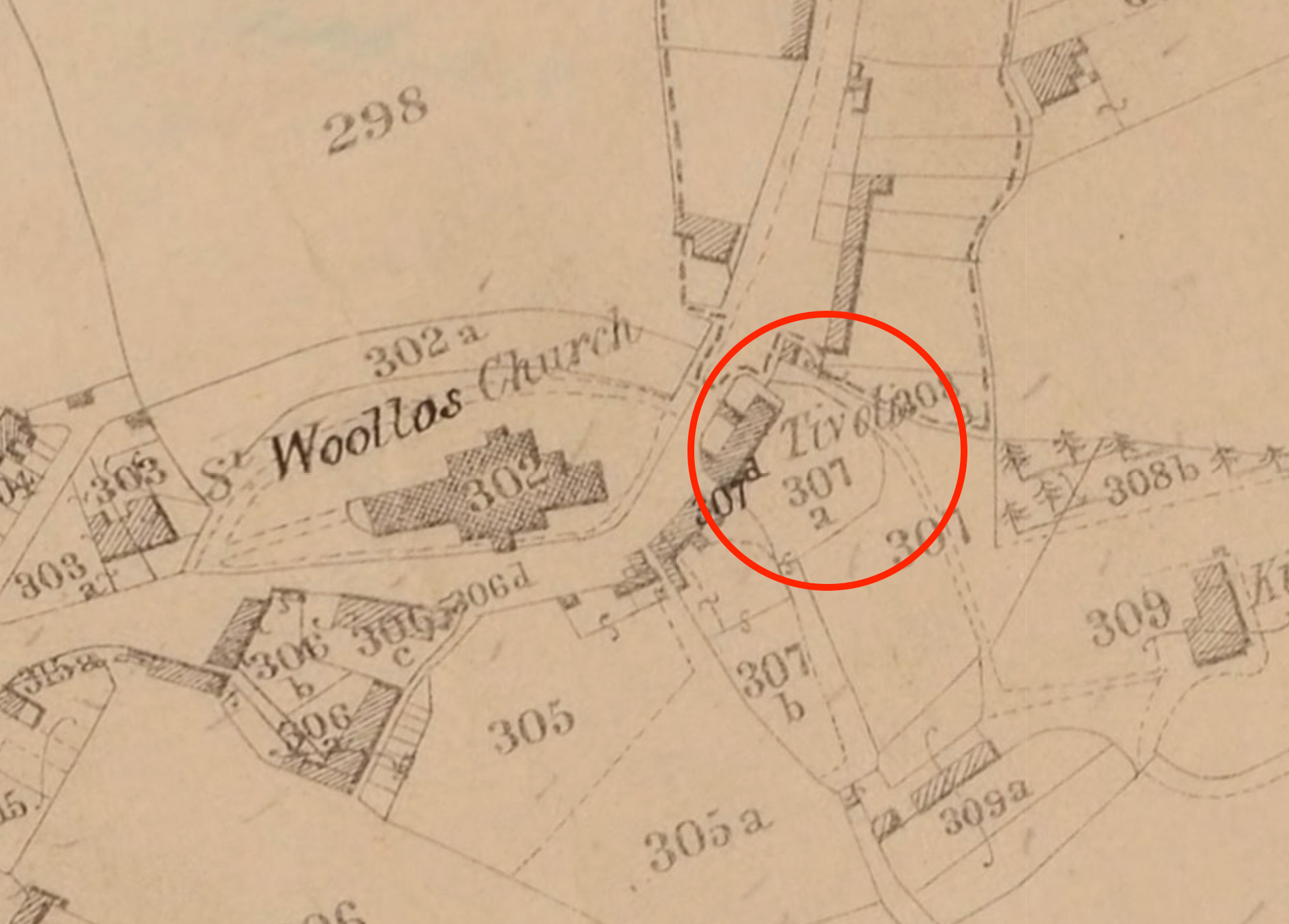
— Monmouthshire Merling, Saturday 5th December, 1829

'The Dangerous State of the Stow Hill Pavement'
SIR, — I beg leave to call your attention, as well as that of the public, to the very unseemly and also dangerous state of the pavement opposite the premises of Mrs Perrott, adjoining the Catholic Chapel, Stow Hill. The writer was informed by Mrs Perrott, that it had been in its present condition for more than two years — that she pays all taxes and is not aware of any cause of the pavement not being put in a safe state to walk upon, save that of her moving in too humble of sphere of life to arrest the attention of those whoe duty it is to attend to such matters. Your giving insertion of these few hints, Mr Editor, will much oblige.
ONE OF THE PUBLIC
Newport, 19th Sept. 1837
— Monmouthshire Merlin, Saturday 23rd September, 1837

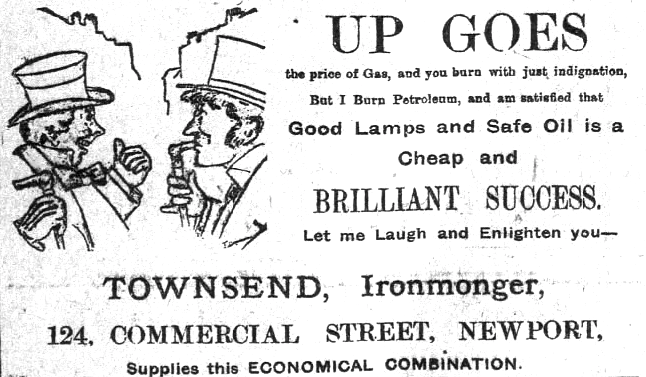

The Lady Slavey

In May 1898, the popular operatta The Lady Slavey played at the Lyceum Theatre. The play, based on the story of Cinderalla, originally premiered in Northampton in 1893 and then played at the Royal Avenue Theatre in London in 1894. It made its way to Broadway in New York in 1896.
Wikipedia has a lot of information about the operatta including the Acts and the songs.
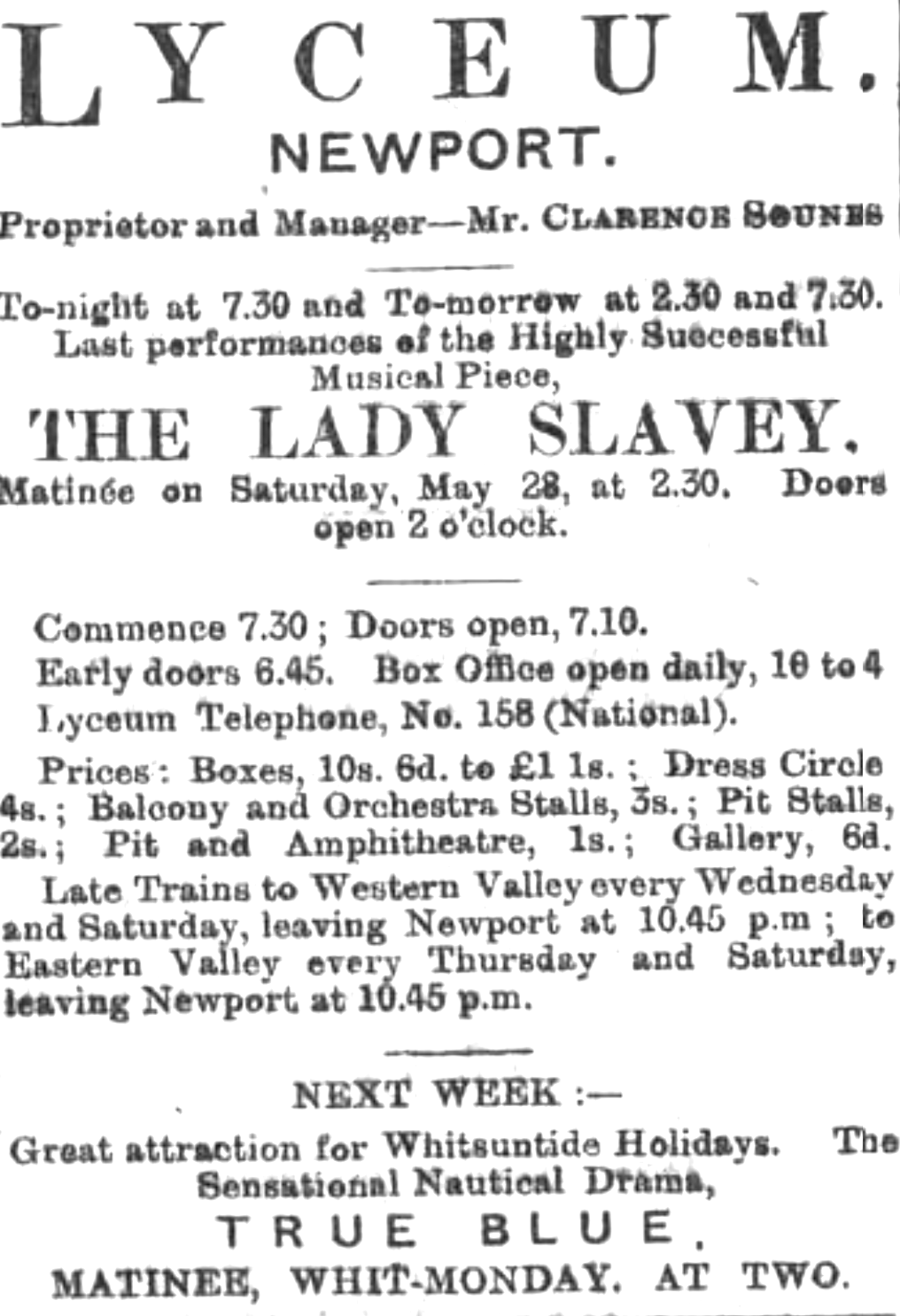
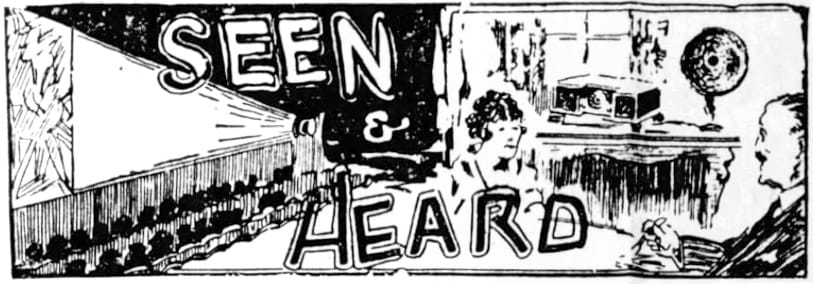
'The Fruit Between Gloucester and Newport'
Cyclists who have this week ridden from Gloucester to Newport say that the country through which they passed contains tons of splendid fruit — especially plums — almost breaking down the tree with its weight, which seems likely to perish for want of a market. The people en route complain that it does not pay them to take the trouble to do the picking. And here is a town with a population approaching 80,000 always complaining of an insufficient and costly supply of fruit. Surely there is a way of bringing this valuable food supply into town at a price which would suit and satisfy both buyer and seller.
— South Wales Argus, Saturday 1st September, 1900 (Subscription Required)
Is Newport a Littery Town?
That is just what the questioner said, although I think he meant "literary". If he had said what he meant one would have hesitated before giving an affirmative answer, but if he meant what he said I reply YES, in capital letters. For proof, come to the street in which I live — to which the rate collector finds his way all too readily — and spend next Sunday morning in counting the pieces of paper, string, vegetable refuse, rags, boots, bottles, &c., to the square yard. To soothe any Sabbatarian prejudices which might otherwise be agitated I should like to say that not a few tracts may be collected and conned during the morning — that is, if an awakened scavenger doesn't hurry up and spoil the plans.
— South Wales Argus, Saturday 1st September, 1900 (Subscription Required)
Newport Traffic
On Friday morning a young man was drawing a heavily-laden truck along the tramway in Commercial Street, yet no policeman thought it his duty to order the culprit to take the proper side of the road. Truly, Newport traffic wants reorganising badly. I have complained of this sort of thing frequently. In time Newport will learn how to conduct its traffic, I suppose.
— South Wales Argus, Saturday 1st September, 1900 (Subscription Required)
Newport Invaded!
For a few minutes this morning this was verily so. The station doors opened and an avalanche of struggling men and women poured into High Street and on to the landing stage and thence to the Britannia, which in a short time was packed with a moving, holiday making pack of humanity. It was an outing arranged for Nettlefold's employees.

— South Wales Argus, Saturday 1st September, 1900 (Subscription Required)
'Dishonest Money Collectors'
By the way, one does not want to hinder the children from being moved to philanthropic service, but street collection easily lends itself to abuse, and may tempt to wrong those who are innocent of all sense of dishonest intent. "If you please sire, will you give me a penny for Dr B.s Orphanage?" "Yes that I will." "But please, sir, don't put the penny in the box." "Why not?" "Oh, I want to spend it." "But what will you buy?" "Oh, anything that I like." This conversation passed between a foot passenger and a bonny, well-spoken fellow in Stow Park this week.
— South Wales Argus, Saturday 1st September, 1900 (Subscription Required)
'The Furthest Distance Flown by a Young Pigeon to Newport'
The capabilities of young pigeons have recently been tested, when a consignment of young birds, the property of Mr Hockey, of Newport, was forwarded to Newcastle-on-Tyne for liberation. The birds were detained through bad weather by Mr Cuthbertson, who kindly undertook to liberate. They were eventually released on the 29th August at 9.20am. The first to arrive at Newport, was a youngster, hatched May 14th, 1900, which returned at 6.16pm the same day, the others arriving later. This establishes a record for Newport and neighbourhood, as being the furthest distance flown by young birds to Newport in the day.
— South Wales Argus, Saturday 1st September, 1900 (Subscription Required)

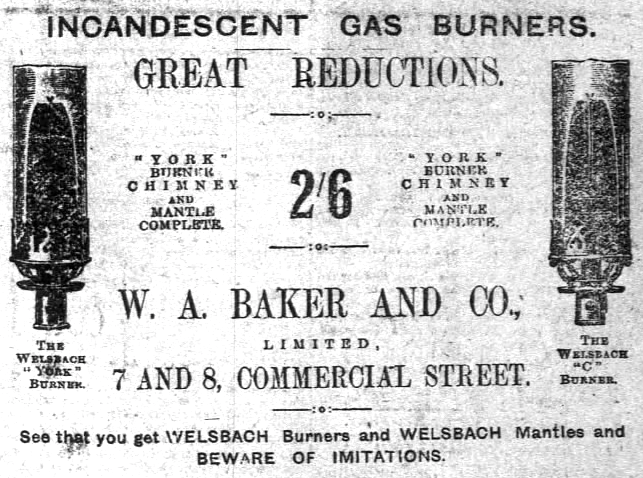

Bathing Within The Borough
To the Editor of the Monmouthshire Merlin
SIR,—Will you allow me a small space in your columns, just to call the attention of our town authorities to this intolerable nuisance, which is practised to an extent disgraceful to the active blue-cloth gentlemen in the mill-pond of this town.
By clause 6 of the Newport Bye Laws, it is provided that. every person who shall bathe in any public situation, &c., shall be liable to a penalty of 40s. Now, are these laws made to be disobeyed? or are there no persons vested with the power of executing them? Surely, if what appears to be the intent of this clause were carried out the respectable inhabitants of the Marshes-road would not be subject to the daily indecent annoyance of seeing men exposing themselves "natus naturi", in open boats, directly facing to and sometimes within two or three yards of their dwelling houses.
The Sabbath also appears to be a favourite day for this as well as boating, both of which might, with little difficulty—if proper means were adopted—be prevented.
Your insertion of the above will oblige, Mr. Editor,
Your obedient servant,
A HOUSEHOLDER
Marshes-road, Newport, July 12, 1847
— Monmouthshire Merlin, Saturday 17th July, 1847


'Alias Cockatoo'
Mary Ann Jones, alias Cockatoo, was charged with being a disorderly character, and having been duly cautioned, was dismissed.
— Monmouthshire Merlin, Saturday 17th July, 1847
'Bets The Cripple and the Leicester Duchess'
Elizabeth Jenkins, alias Bets the Cripple, and Mary Lester, alias the Leicester Duchess, were brought up again, charged with having brutally assaulted with an iron scraper the head of Thomas Jenkins. It appeared that the parties resided in Friars' Fields, and that this was a general quarrel, in which all parties deserved blame alike. The magistrates therefore dismissed the case.
— Monmouthshire Merlin, Saturday 24th July, 1847
'Tom the Irish Consul'
Thomas Welsh, a jaunty-looking Irishman, whose pig and horse-dealing transactions between his countrymen and the Newport folk have affixed to his name the sobriquet of Tom, "the Irish Consul," was charged with having been flourishing his shillelah in a state of drunkenness, during a paroxysm of which happy state, he had brought the aforesaid shillelah into sudden contact with the head-piece of poor Ned Miles.
Miles, who is supposed to be the genuine "Miles's Boy," did not feel the milk of human kindness changed to gall in his bosom, and knowing that "To err is human—to forgive divine," he pitied the erring Consul, and declined to prosecute. The magistrate, therefore cautioned Tom against a repetition of his improper freaks, and discharged him from custody.
"Now, thin, may ye live for iver, yer wertchip, cried Tom for it's yersilf is the raal gintleman, afther all." "Blarney, Tom, blarney go on." And the Consul, giving his best bow benchward, made his exit.
— Monmouthshire Merlin, Saturday 24th July, 1847
Lock Your Tills
William Dewsbury, who gave a different name when taken into custody, was charged with stealing money from the shop till of Mr. Lewis, Stow Hill. The prisoner, as we stated last week, was seized at the moment of pocketing the money he had been observed to take from the till. He denied having taken any money, saying he had been trying to get a biscuit! but he afterwards gave up four shillings.
Mr. Dewsbury was ordered to be imprisoned two months, with hard labour. It is surprising there should be such carelessness evinced by shopkeepers, in regard to their tills, as to leave both shop and till quite unprotected, thus offering an inducement to the hordes of thieves who prowl about, of which they are not slow to avail themselves.
— Monmouthshire Merlin, Saturday 24th July, 1847
'A Lazy, Hulking Fellow'
Robert Williams, who looked a "lazy, hulking fellow," was charged with having been drunk and disorderly in High-street. The prisoner, it appears, pretends to be one of those mysterious fellows, a smuggler, who whisper to simple people in the street, telling them of a "splendid bargain—smuggled!" and wiling them into beershops, where they sometimes succeed in passing off some vile trashy article as first-rate contraband.
It is supposed the prisoner had been thus engaged in a beerhouse, when he received from somebody a pummelling, which nearly blocked up his eyes, and made his face look like a large plum-pudding. In this guise he was discovered in High street, very disorderly, and was taken into custody by the police. Fined 5s. and expenses.
— Monmouthshire Merlin, Saturday 24th July, 1847
Stealing a Sack of Flour
Job Taylor and Caroline Davies, the former the haulier of Messrs. Southan and Co., and the latter the keeper of the Fortune of War beerhouse, were charged with stealing a sack of flour, three dozen of brushes, and two bottles of wine.
Mr. Woollett examined witnesses, from whose evidence it was shown, that Taylor was taking twenty-five sacks of flour to the stores of Mr. Lobbett in Llanarth-street, on Saturday week, and on the way up stopped at the prisoner Davies's beer- shop, and carried in there one of the sacks of flour. This being observed by Mr. Rudge, agent to Mr. Barret, flour-dealer, of Gloucester, who had sent the flour to this port, he enquired of Taylor why he was taking the flour in there. He said a man in Mr. Lobbett's employ told him to do it, but he didn't know the man's name. The flour was afterwards found in Davies's house, emptied into another sack, and partly used by her, as she acknowledged, and the prisoners were thereupon taken into custody.
Some doubt appeared to exist in the mind of Mr. Latch, relative to the commitment of the female prisoner, as we understood; but the Mayor committed both prisoners to take their trial at the assizes. The charge respecting the brushes and wine was not proceeded with.
— Monmouthshire Merlin, Saturday 17th July, 1847

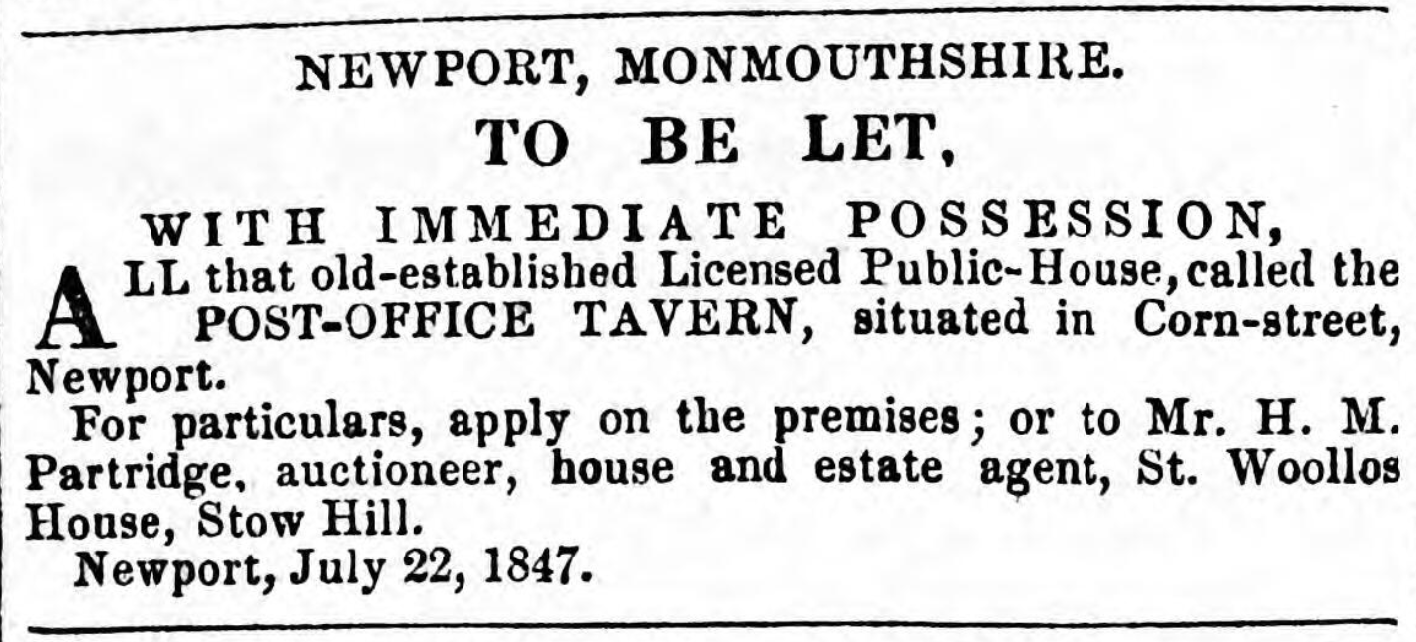


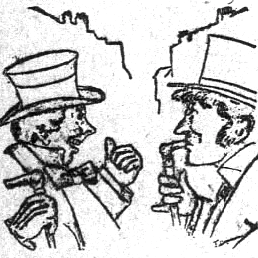
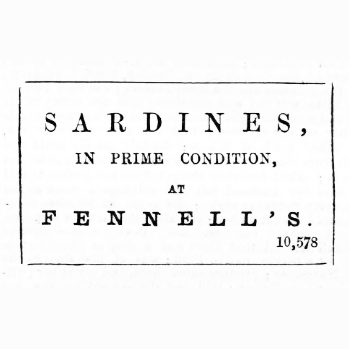
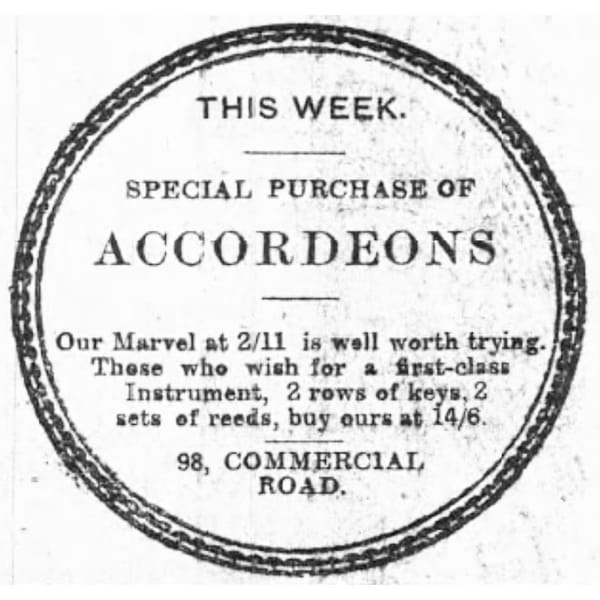
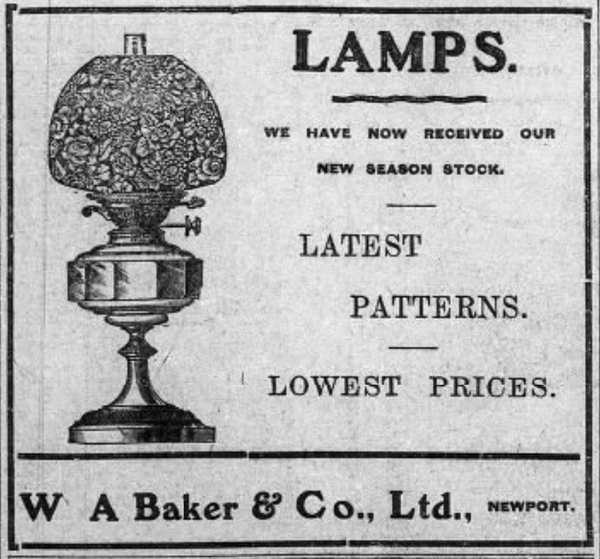


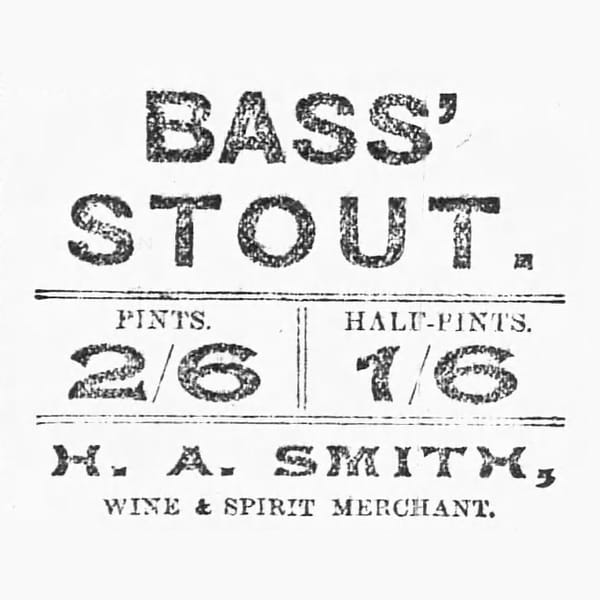
Member discussion